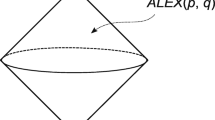Abstract
The Diodorean interpretation of modality reads the operator □ as “it is now and always will be the case that”. In this paper time is modelled by the four-dimensional Minkowskian geometry that forms the basis of Einstein's special theory of relativity, with “event” y coming after event x just in case a signal can be sent from x to y at a speed at most that of the speed of light (so that y is in the causal future of x).
It is shown that the modal sentences valid in this structure are precisely the theorems of the well-known logic S4.2, and that this system axiomatises the logics of two and three dimensional spacetimes as well.
Requiring signals to travel slower than light makes no difference to what is valid under the Diodorean interpretation. However if the “is now” part is deleted, so that the temporal ordering becomes irreflexive, then there are sentences that distinguish two and three dimensions, and sentences that can be falsified by approaching the future at the speed of light, but not otherwise.
Similar content being viewed by others
References
A. Prior, Past, Present and Future, Oxford 1967.
K. Segerberg, An Essay in Classical Modal Logic, Filosofiska studier 13, Uppsala Universitet, 1971.
K. Segerberg, Decidability of S4.1, Theoria 34 (1968), pp. 7–20.
A. A. Robb, A Theory of Time and Space, Cambridge 1914.
Author information
Authors and Affiliations
Rights and permissions
About this article
Cite this article
Goldblatt, R. Diodorean modality in Minkowski spacetime. Stud Logica 39, 219–236 (1980). https://doi.org/10.1007/BF00370321
Received:
Issue Date:
DOI: https://doi.org/10.1007/BF00370321




